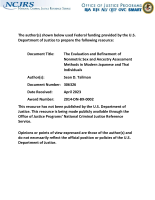Ancestry assessment
The Idaho Student Homicides and the Future of Forensic Genetic Genealogy
Guiding Interpretation: Leveraging High-Density SNP Data from Major U.S. Populations for Forensic Genetic Analyses
Advancing Justice for the Missing and Unidentified Through Research - 2024 NIJ Research Conference
Forensic science research is developing essential knowledge to fill in the holes in death investigations, creating new ways to identify challenging skeletal remains. These methods inform cause of death, time of death, and familial relationships to guide investigations, identify suspects, support prosecutions, and bring justice to families.
See the YouTube Terms of Service and Google Privacy Policy
Age estimation from epigenetic features of hair DNA
An Admixture Approach to Trihybrid Ancestry Variation in the Philippines With Implications for Forensic Anthropology
Macromorphoscopic trait expression in a cranial sample Medellin, Colombia
Molar Crenulation Trait Definition and Variation in Modern Human Populations
Intraobserver Error in Macromorphoscopic Trait Data
Flanking Region Variation of ForenSeq (TM) DNA Signature Prep Kit STR and SNP Loci in Yavapai Native Americans
A panel of 74 AISNPs: Improved Ancestry Inference within Eastern Asia
Support Activities under Section 13(d) of Executive Order 14074: Workshops on Law Enforcement Use of Probabilistic DNA Technologies and Person-based Predictive Policing
Evaluation of Target Enrichment for SNP Genotyping of Skeletal Remains
Democratizing investigative genetic genealogy
Development of computational methods for genetic identification and kinship analysis of forensic samples
The Evaluation and Refinement of Nonmetric Sex and Ancestry Assessment Methods in Modern Japanese and Thai Individuals
Refining Asian Ancestry Classifications via Cranial Macromorphoscopic Traits
NIJ Awards Over $11 Million to Support Forensic Science Research and Development in 2022
On September 30, 2022, NIJ announced $11.6 million in funding to support 23 projects under the “NIJ FY22 Research and Development in Forensic Science for Criminal Justice Purposes” solicitation. Through its research and development grant funding, NIJ continues to advance the speed, accuracy, and reliability of forensic analysis, which ultimately bolsters the...



